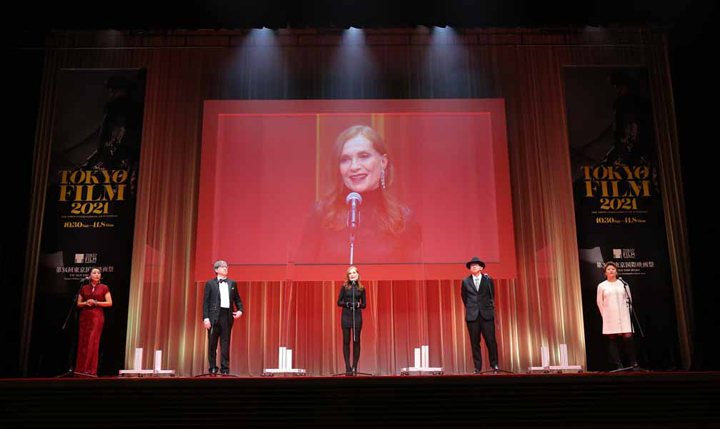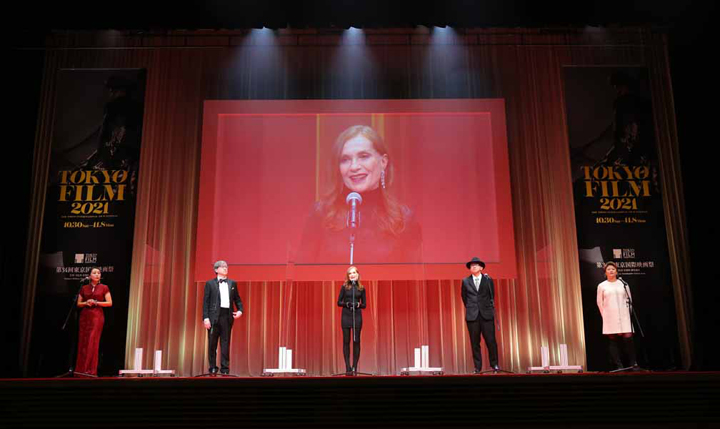
IT is early autumn in Tokyo, and on October 30 the 34th edition of the Tokyo International Film Festival (TIFF) finally opened. Clint Eastwood, we would learn later, would not be able to make it. But Isabelle Huppert, the great French actress, was there to grace the red carpet and be the chair for this year’s jury.
Huppert was with another juror, Lorna Tee, on the red carpet, preceded by fellow jurors Aoyama Shinji, Chris Fujiwara and Sebu Hiroko.
Aoyama is a filmmaker and a novelist. In 2000, his film Eureka became part of the Cannes Film Festival, where it won for him both the FIPRESCI prize and the Prize of the Ecumenical Jury. In 2011, his Tokyo Park won the special Golden Leopard award at the 64th Locarno International Film Festival.
Chris Fujiwara is a film critic and programmer. He is the author of books on cinema. I had the honor of working with him as mentor for the Yamagata International Film Criticism Workshop, when it was held during the last pre-pandemic edition of Cinema Rehiyon in the city of Naga, Camarines Sur.
Sebu is a composer who studied, outside her academic stint at the Ecole Normale de Musique de Paris, under the French Oscar-winning composer Gabriel Yared. She is known for her work on Arc in 2021 and Final Fantasy VII Remake in 2020.
Lorna Tee is a pan-Asian film producer and also a film festival organizer. She navigates Europe and Asia having worked for Focus Films of Hong Kong, Irresistible Films of Hong Kong and Japan, and the Berlinale, among many other engagements. She manages her own production company Paperheart (Malaysia), which aims to produce films across Asia.
Isabelle Huppert has two Best Actress awards from the Cannes Film Festival and two Volpi Cups for Best Actress at the Venice Film Festival. She has acted in Brillante Mendoza’s film Captive. Mendoza’s film Payback is now in competition in this year’s edition of the TIFF.
Legendary already is the orderliness of the TIFF and any international event organized by the Japanese in Japan. The celebrities had to walk up to the end of the carpet, which was at the bottom of a winding staircase. They were to stand there and had to wait for the guide to motion them to go up the stairs. Once they were seen by the hosts, they were then introduced and another guide, hands in white gloves (not a measure against the virus but the most formal sign of welcome) ushered them to a wall. A woman this time carried a tray on which were placed two or three (depending on the number of the production team represented) wireless microphones. These were handed from left to right. No deviation from that order.
Due to the pandemic, according to organizers, safety measures and other rules are to be observed during all the physical screenings, Q&A sessions, master classes and the Conversation Series at Asia Lounge, all of which will be held in TIFF’s new venues in the Yurakucho-Hibiya-Ginza area of Tokyo. The former venue was in Roppongi. Some Q&A sessions will be taking place online to accommodate filmmakers who are overseas; many other events will be livestreamed. The festival will be screening 126 films physically, including outdoor screenings. Fifteen titles are competing for the Tokyo Grand Prix in the International Competition, 10 of them world premieres, drawn from 1,533 submissions from 113 countries and regions.
Other luminaries who graced the opening ceremonies were: director Yukisada Isao, actress Watanabe Makiko, and Andrijana Cvetkovikj, former Ambassador of the Republic of North Macedonia to Japan, who are serving on the Amazon Prime Video Take One Award Jury; director Ishii Yuya, who is serving on the Asian Future Jury; and three leading film festival directors: Frédéric Boyer (Artistic Director, Tribeca Film Festival), Christian Jeune (Director, Film Department/Deputy General Delegate, Cannes Film Festival) and Carlo Chatrian (Artistic Director, Berlin International Film Festival). They will be speaking at the World Cinema Conference: The Future of the Film Industry.
Inside the Tokyo International Forum, the opening ceremonies began with a live performance by the Women Orchestra Japan playing a medley of songs from beloved films.
New TIFF Festival Chairman Ando Hiroyasu, welcoming the audience, shared how the organizers had been “on the edge of our seats until the very last minute, wondering if we would be able to hold the film festival this year. But today, the pandemic has subsided, and we are thrilled to be able to welcome so many people to the opening.”
The TIFF also announced its new programming director, Ichiyama Shozo. The Japanese Prime Minister Kishida Fumio appeared via video, with his comments about how in the middle of this pandemic, he would like “to express my gratitude to all of you for your ingenuity and dedication in organizing this new type of film festival, a hybrid of the real and online.”
The buzz of course in the evening was about the opening film, Cry Macho, and its filmmaker, Clint Eastwood. The night turned out to be a tribute to the actor who was marking his 50th anniversary as a director, which began in 1971. Steven Spielberg, Mel Gibson and Hilary Swank appeared also on-screen to talk about Eastwood’s legacy.
Then, a letter from the Eastwood himself appeared on-screen. “Hello Japan,” it began.
Eastwood expressed how through this film, he could deliver his interpretation of “true strength.” He ended his speech with this line: “Cry Macho was shot during the pandemic, and I hope it can be one of the films to bring courage and strength to the film industry…”
The 34th Tokyo International Film Festival is ongoing until November 8. Brillante Mendoza’s Payback (Resbak) and Gensan Punch, a Philippines/Japan coventure, are in competition.

